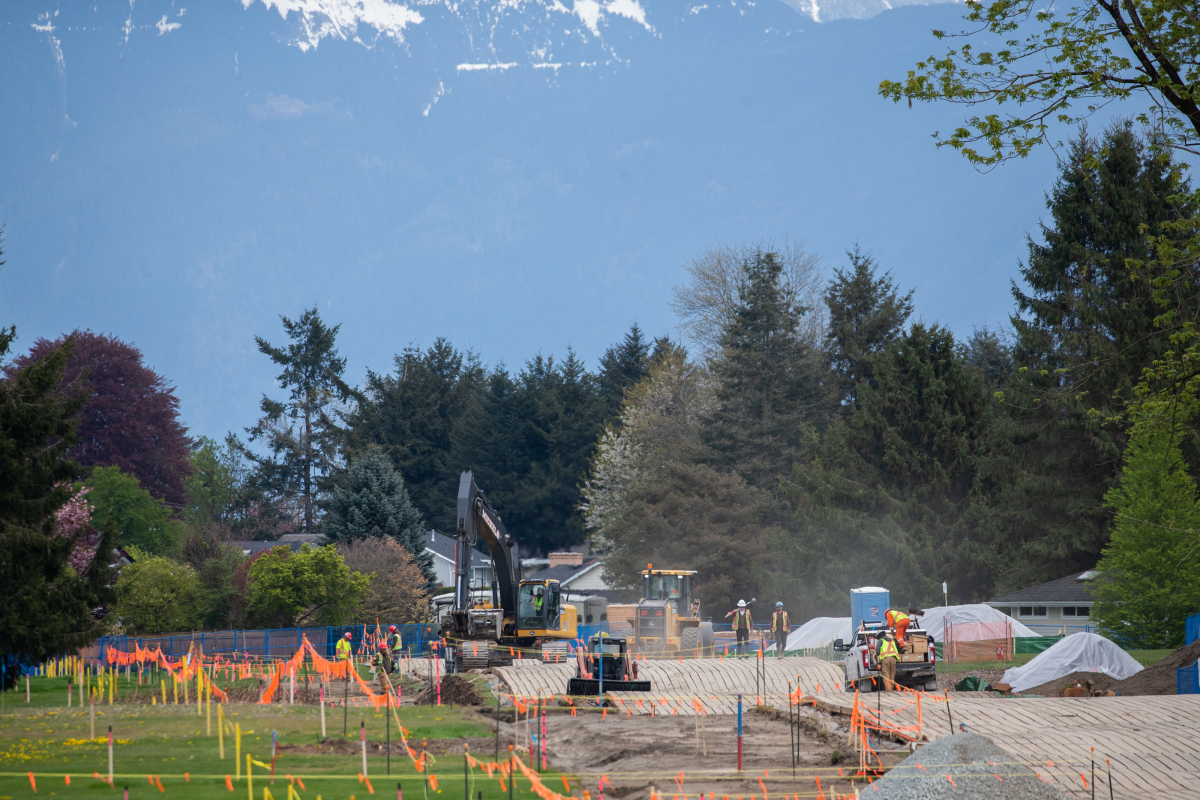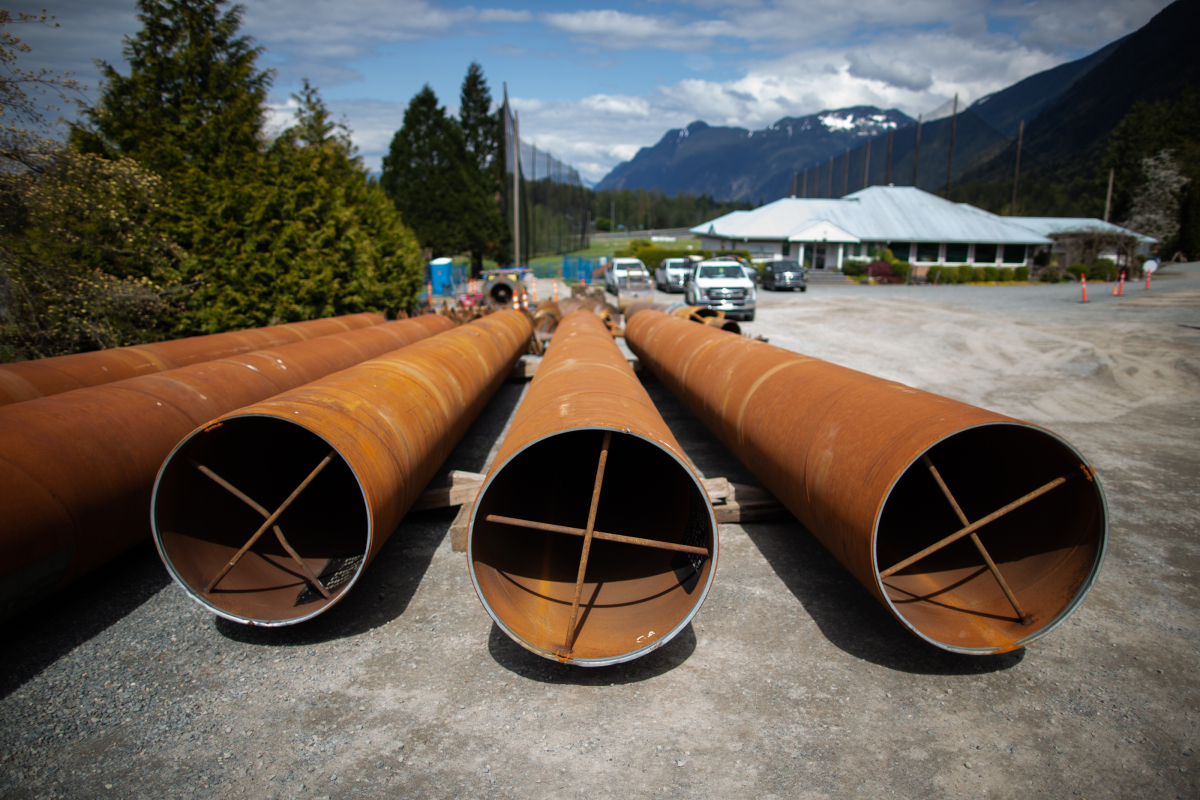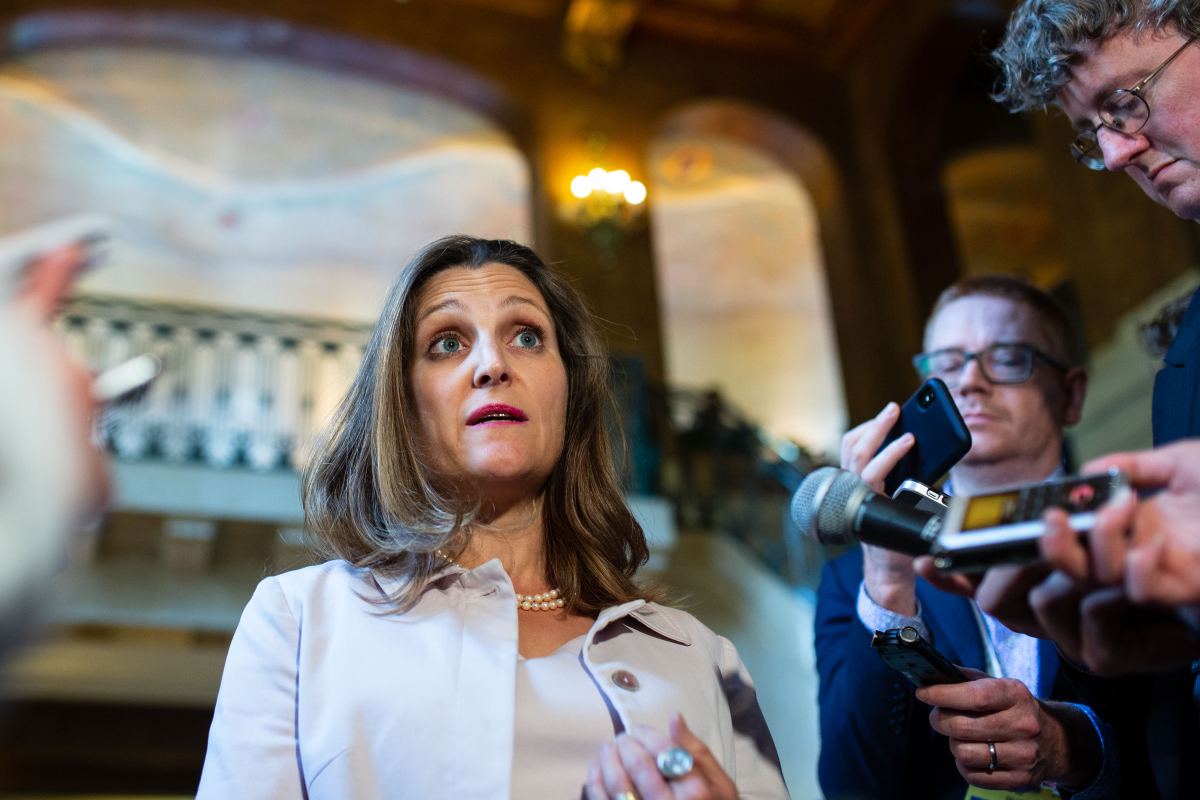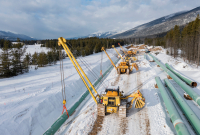Finance Canada has helped Trans Mountain secure $10 billion in new financing to complete construction of the controversial pipeline by promising investors that if the Crown corporation can’t pay back the loans, the public will.
The federal loan guarantee decision was made on April 29, the same day a United Nations human rights committee urged Canada to stop construction of the pipeline over alleged human rights violations. By guaranteeing the Crown corporation’s debt, Finance Canada says it was able to help find unnamed third-party financiers for the project. But ultimately, the decision puts even more public dollars on the line because if Trans Mountain (TMX) defaults on its payments, Ottawa will assume the debt.
Loan guarantees are a way governments can make risky projects attractive to private investors by promising that if things go sideways, the public will shoulder the costs. It should also help lower the cost of borrowing for Trans Mountain because a federal debt guarantee leverages Canada’s strong credit rating.
In a statement, Finance Canada called the federal loan guarantee “a common practice which puts in place an insurance policy for the institutions that have invested in the project” but “does not reflect any new public spending.”
The federal government may say it’s not spending any more cash directly, but it is still asking taxpayers to take on the risk, Tom Sanzillo, director of financial analysis with the Institute for Energy Economic and Financial Analysis (IEEFA), told Canada’s National Observer in an interview.
Finance Minister Chrystia Freeland’s previous assertion that Canada will invest no more public money in TMX is “grossly misleading,” he said. Taxpayers may not pay now, but they will if Trans Mountain defaults on the loan, Sanzillo explained. Very little is known about this new guarantee, and without more information, it’s impossible to assess the likelihood of a default. That leaves even experts like Sanzillo “with a whole bucket full of questions,” he said.

Trans Mountain’s ‘culture of secrecy’
Freeland insists the project is still commercially viable, but her department refuses to cough up the evidence to prove it.
More than two months ago, Freeland said financial analyses from securities experts confirm debt financing for the project is a “feasible option” and support the government’s claim there is “potential” to recoup costs. However, Canada’s National Observer could not verify this statement because Finance Canada refused to share the analyses done by BMO Capital Markets and TD Securities, despite repeated requests.
“The BMO Capital Markets and TD Securities analyses contain information provided in confidence that is commercially sensitive and would, if disclosed, prejudice the government in future negotiations, including with prospective purchasers in a divestment process,” a Finance Canada official said.
It is worth stating directly this is a choice by Finance Canada officials to keep the public in the dark about billions of dollars of public spending that experts say has been mismanaged. An access-to-information request for the analyses has been submitted.
These reports likely contain important information that could help make sense of this vague announcement, said Sanzillo.
Canada’s National Observer requested information on the possibility of loan guarantees multiple times and communicated with Finance Canada media relations in the weeks leading up to the day the $10-billion loan guarantee was approved. The day after its approval, the department reissued a previous statement sent to Canada’s National Observer — which regurgitated a previous press release and addressed none of the questions posed.
The department’s refusal to share the BMO and TD analyses, or communicate its decisions in real time, is simply a “continuation of this culture of secrecy of the lack of transparency with respect to Trans Mountain,” said Eugene Kung, a staff lawyer with West Coast Environmental Law.
After the project’s costs soared by 70 per cent to $21.4 billion earlier this year, Freeland said Trans Mountain Corporation will need to secure third-party funding through banks or public debt markets to complete the pipeline expansion project. Canada’s Parliamentary Budget Officer Yves Giroux told Canada’s National Observer the federal government is “very unlikely” to recoup its initial $4.5-billion investment, and it will likely mean losses for Canadian taxpayers when the government eventually sells the pipeline.

‘Either way you look at it, Canadian taxpayers are on the hook’
There are a host of “fundamental issues baked into the economics of Trans Mountain” that will make it difficult to become commercially viable, Kung said.
A recent report from the IEEFA, co-authored by Sanzillo, examined the issues and concluded Freeland’s plan will leave taxpayers on the hook for up to $26.1 billion. That figure could be even higher with the recently disclosed federal loan guarantee, but without more information from Finance Canada, Canada’s National Observer cannot verify the degree of public exposure.
At the current level of cost overruns, the Trans Mountain pipeline would have to raise tolls to a prohibitive level to pay for its new debt and operational costs and still turn a profit for investors. Oil producers are charged tolls to use the pipeline, and the stated purpose of the project was to keep oil transportation costs low so they can stay competitive in international markets. If tolls were raised to offset costs, oil producers wouldn’t be able to sell their product at a competitive price. The report finds “to compete, the government would have to maintain toll rates so low that it would be operating TMX at a loss for its investors.”
The project could generate profit if toll rates were more than doubled. But a 2018 toll agreement producers signed with Trans Mountain stipulates they will only bear the risk of covering 25 per cent of future cost increases, the report points out. If the tolls rise any higher, producers can terminate their agreements.
With the business case for the pipeline strained as costs skyrocket, it is not clear if Trans Mountain will be able to pay back any new investors.
“Once again, Justin Trudeau and Chrystia Freeland have lied to Canadians about the Trans Mountain pipeline, and once again, it will cost Canadian taxpayers billions of dollars of public funding,” said Sven Biggs, director of the Canadian oil and gas program with climate advocacy group Stand.earth. “This is just more evidence that this pipeline is not viable, and that (it) is way past time that the Liberal government allowed this project to be cancelled.”
The loan guarantee didn’t come as a surprise to the IEEFA’s Sanzillo. His report found guaranteeing the remaining construction costs would be vital to attract investors.
Sanzillo said because TMX is in such poor financial shape, to attract private-sector investors the federal government is likely to also subordinate its own debt, meaning any potential profit would flow to the private sector investors first.
“So it's very likely that the private sector will get paid back and, of course, you have Canadian taxpayer dollars paying for it, effectively,” he added. “Either way you look at it, Canadian taxpayers are on the hook.”

TMX profits may never come
In 2019, the federal government proclaimed "every dollar" earned from the pipeline would "be invested in Canada's clean energy transition" as part of its justification for purchasing it from Kinder Morgan.
But based on publicly available information, the idea profits from Trans Mountain will pay for Canada’s climate action, or anything else for that matter, is simply up in smoke.
Public investment in TMX sat at $17.3 billion as of Sept. 30, 2021, according to the IEEFA report's analysis of Trans Mountain Corp.’s financial statements. Of that, $12.6 billion went towards construction costs, and the remaining $4.7 billion represents the cost of acquiring the pipeline in 2018.

The recent IEEFA report states government claims TMX could be sold at a profit “lacked credibility,” and the organization’s requests for detail from the government “have gone ignored.” It will simply be “impossible” for Canada to sell the pipeline for more than it has spent, the report finds.
“With a project that is too far gone to rehabilitate and a government determined to deliver its boon to the oil and gas industry, public debt markets and banking institutions may, as Canada’s (finance minister) has stated, look at funding TMX — but only as a distressed opportunity with a taxpayer-funded guarantee to safely fund the unfundable,” the report states.
Given Ottawa is barrelling ahead, the best way forward is to provide greater transparency, Sanzillo said.
“Governments sometimes succeed and everyone is happy. They sometimes fail, and people will understand the failure if it's explained to them. And sometimes they just muddle through, which is kind of like what everybody does in life, right?” he said. “But the worst thing in the world, which is what's being practised now, is for the people not to be told.”
A $10-billion subsidy, critics say
Guaranteeing a loan to entice investors essentially amounts to a subsidy, said Kung, the environmental lawyer, pointing to Alberta Premier Jason Kenney’s decision to prop up a risky energy project with public money.
In 2020, the Alberta government committed $1.5 billion in direct financing and $6 billion in loan guarantees to TC Energy Corporation to support construction of the now-defunct Keystone XL pipeline.
When the project was cancelled in June 2021, five months after U.S. President Joe Biden revoked its permit, the Alberta government had to pay TC Energy’s $1-billion loan balance. Alberta is now seeking $1.3 billion in compensation from the U.S. government.
Loan guarantees like this are fossil fuel subsidies, according to the World Trade Organization’s widely accepted definition. Despite the Liberal government’s promise to end fossil fuel subsidies by 2023, it has yet to establish its own definition. Although the loan guarantee provided by Crown corporation Export Development Canada (EDC) would qualify as a subsidy under WTO’s definition, Environment and Climate Change Canada Assistant Deputy Minister Hilary Geller recently told the Standing Committee on Natural Resources what EDC does “... does not meet the definition of subsidy.”
This $10-billion guarantee is “another broken promise from a government that committed to end fossil fuel subsidies,” said Julia Levin, national climate program manager at Environmental Defence.
The world’s greenhouse gas emissions need to start falling before 2025 to avoid catastrophic levels of warming, which requires a swift move away from fossil fuels and increased investments in renewables, the Intergovernmental Panel on Climate Change (IPCC) warned in its latest report.
This means if the energy landscape continues to change, the investment in TMX will require a payback period that could exceed the lifetime of the pipeline, the IEEFA report warns.
Ottawa silent on pledge to use TMX money for climate action
When the project’s cost estimate sat at $12.6 billion, the Parliamentary Budget Officer determined even a 10 per cent increase in construction costs would threaten the profitability of the whole project. Now, with the price tag 70 per cent higher, Giroux doesn’t expect any surplus cash to materialize. In August, then-environment minister Jonathan Wilkinson told CBC’s Power and Politics the project’s revenue would be necessary for the energy transition. But ever since Trans Mountain Corp. announced the project’s costs have ballooned by 70 per cent, the federal government has refused to answer questions about its pledge to invest earnings from TMX in climate action.
Canada’s National Observer asked Wilkinson whether he is still confident the project will pay for climate action in light of the cost increase and Giroux’s comments, along with how the government will replace revenue from the project that would have gone towards climate action and what justification for the project remains given the International Energy Agency and IPCC have warned no new fossil fuel infrastructure is needed if the world is to hold warming to 1.5 C.
Wilkinson’s press secretary, Keean Nembhard, refused to comment and said the department would defer to responses provided by Finance Canada.
Canada’s National Observer asked Finance Canada similar questions in the weeks after the cost increase was announced. Finance Canada spokesperson Benoit Mayrand responded to the request nine days after the deadline with a rehashed version of a press release attributable to a Finance Canada official. The release did not include a single mention of “climate” or address any of the questions posed. The exact same statement was sent to Canada’s National Observer in response to a separate set of questions about the analyses from TD and BMO.
After being pressed for answers multiple times throughout March, Mayrand came back with a statement from Finance Canada informing Canada’s National Observer that a press conference was held when TMX’s cost estimates were announced on Feb. 18. “All media outlets had the possibility to attend and ask any questions they had on that topic,” the statement reads.
Kung from West Coast Environmental Law said the federal government has justified TMX by saying its “bad” impacts — like the infringements on Indigenous rights and the emissions it will create — are balanced out by the “good,” generally citing economic benefits.
“We're in a situation now where it's not even clear that there will be any economic benefits. In fact, there may even be, there will likely be, significant losses,” said Kung. “So that just changes the whole equation about what are you trying to justify?”
Although all available evidence suggests the federal government’s pledge to use TMX earnings for climate action is a fantasy, Sanzillo from the IEEFA said it could still technically use revenues for this purpose if it gives up on recouping its debt.
“But even there, our report today is suggesting that it would be very little money and that the current structure of the finance is such that it would barely cover operational costs, much less any debt or surplus payments,” said Sanzillo.








Comments
It is shameful what this government is doing by subsidizing big oil expansion like TMX and allowing Bay du Nord to proceed. We are being lied to when it comes to costs of these projects and how much tax payers are going to have to pay to flip the bills. Well perhaps they are trying to get votes in Alberta???? and Nfld
It has been obvious to anyone with half a brain that TMX has never made sense (except as a gift to the foreign owners of the fossil fuel industry). The financial non-viability was clear when the Government had to buy out the pipeline because the original owners recognized the non-viability. It is plainly inconsistent with IPCC's conclusion (and the UN edict) that ANY expansion of fossil fuel infrastructure is contraindicated based on climate science and it's in violation of UNDRIP. The money spent on TMX could have been so much more beneficial if used to support green energy!
It's just too bad that the Trudeau and Freeland can't be sued for failure in fiduciary responsibilities for sound management of public funds ... something that sorely needs to be reconsidered not only at the Federal level but Provincial (e.g. LNG in BC).
Good sleuthing.
Once again, the federal govt gives journalists the royal runaround.
Article: "In 2019, the federal government proclaimed 'every dollar' earned from the pipeline would 'be invested in Canada's clean energy transition' as part of its justification for purchasing it from Kinder Morgan."
If pipeline returns are negative, will the Liberals take money out of the clean energy budget to pay for the pipeline?
Better ask the Liberals to define "clean" energy.
In the Liberals' lexicon, "clean energy" includes fossil fuels.
In 2017 Ottawa announced $28.8-million in grants for 11 companies focused on "clean energy and water technology".
"Canada and Alberta invest in clean technologies to encourage clean growth"
- $10 million to develop energy-efficient ways to explore for oil deposits;
- $8.2 million to develop a new process to cool steam created during oil production;
- $1.9 million to develop new control systems to eliminate methane emissions from pneumatic equipment;
- $1 million to develop new systems for water treatment in oil extraction operations;
- $1 million to develop a new process to treat water recovered during oil and gas production;
- $1 million to build a water desalination plant to eliminate the freshwater needed for oil production;
- $1 million to develop a new water treatment process to lower costs and reduce the need for wastewater disposal during oil production;
- $1 million to develop a new process to reuse water in oilfield operations and reduce the demand for freshwater;
- $950,000 to adapt water treatment processes to reduce costs associated with the transport and disposal of wastewater produced during oil production;
Of the $28.8 million for 11 "clean technology" projects, $26,078,000 or 91% went to 9 oil & gas industry projects.
$0 and 0% on renewables.
No subsidies for the oil industry, of course. Just $28.8-million in grants, because the oil giants can't afford to fund their own R&D.
"Canada and Alberta invest in clean technologies to encourage clean growth" (Sustainable Development Technology Canada, Nov 2017)
•https://www.sdtc.ca/en/news/governments-canada-alberta-invest-cutting-e…
"Alberta company receives grant for new technology to extract bitumen" (Edmonton Journal, Nov 3, 2017)
•http://edmontonjournal.com/technology/tech-biz/alberta-company-receives…
The Sustainable Development Technology Canada (SDTC) link above is broken. You can find the announcement here:
https://web.archive.org/web/20180930005804/www.sdtc.ca/en/news/governme…
Yet another win for CAPP!
While CAPP claims to champion Canadian interests, it is heavily dominated by Big Foreign Oil. Researcher Gordon Laxer found that of the 48 corporations on CAPP’s 2020 board, 37 (or 77 per cent) were confirmed, or likely, fully or majority foreign-owned.
http://canadians.org/BigForeignOil
Through CAPP, these foreign multinationals influence our federal and provincial elections, make financial contributions to political parties and candidates, lobby governments, and mobilize so-called ‘grassroots’ groups to further their interests.
As long as corporate lobbying has exclusive hold of government ears, (any government), the environment loses.
Unfortunately no government can negotiate with Nature, so we all lose!!
Meanwhile ...
Protect the Planet PRESS RELEASE
For Immediate Release: May 10, 2022
Tsleil-Waututh Land Defender Will George Sentenced to 28 Days in Jail for Breaching Trans Mountain Injunction
Before a courtroom packed with supporters, Tsleil-Waututh Land Defender Will George was sentenced to 28 days in jail for breaching the Trans Mountain Expansion (TMX) pipeline injunction and was immediately taken into custody. BC Supreme Court Justice Shelley Fitzpatrick deferred to the Crown’s recommended sentence and all but ignored arguments from defence counsel for why George should instead be sentenced to community service hours and probation.
Today was Day 2 of George’s sentencing hearing. Yesterday, Justice Fitzpatrick stated in the morning that she had not read George’s 16-page Gladue report, which lays out his childhood history and cultural background, and gives reasons why the court should consider non-custodial sentencing options. Although Fitzpatrick has had the report for months, she took only a 15-minute break to scan it, after which she was ready to sentence George the same day. “It was clear from Fitzpatrick’s tone and attitude in court that Will George’s Gladue report, and the principles on which it’s based, don’t matter to her,” said Rita Wong, a supporter of Will George.
George was targeted and charged by the Crown in January 2021 with criminal contempt despite never being arrested, and during a period when pipeline work had been suspended. George—who was tried last fall—is the first Tsleil-Waututh member to be convicted for resisting the TMX pipeline while on his own ancestral, unceded land. Despite George being present with several others on the day he was accused of breaching the TMX injunction, the Crown only brought charges against George.
“This is yet another example of the Crown continuing its long history of systemic racism and colonial violence, as it tries to separate Indigenous people from their land and criminalize them for defending it from harmful resource extraction,” continued Wong. “The Crown is meant to represent the public interest, yet it wilfully obstructs those trying to address the climate crisis, and instead pushes oil and gas projects that go against everything humanity is being called to do. Criminalizing indigenous land defenders is racist and unjust.”
The Crown prosecutor sought a stiff jail sentence for George even though the BC Prosecution Services has a policy of seeking non-custodial sentences for Indigenous defendants, with jail time being a “sanction of last resort.”
I've not liked nor trusted this woman since she tried to pull of the scam of Juan Guido as the legitimate president of Venezuela. Regime change by selfie was a bridge too far, even for the right wing USA, who was likely calling the shots. Believing you can twist reality to that extent suggests you have psychotic tendencies.
Promising Canadians will be on the hook for this soon to be stranded asset confirms my suspicions in that regard.
One just cannot trust these lying Liberals to do the right thing ever. Disgusting climate abuse and betrayal of Canadians to profit their petroleum donors and themselves. Last years heat wave meant nothing to these morons as they plod along pushing this dirty pipeline. Inexcusable.
The article states, "An access-to-information request for the [BMO Capital Markets and TD Securities] analyses has been submitted."
Can Ms. Bulowski, Mr. Woodside, anyone else from the National Observer, or anyone else reading these comments indicate what the typical wait time is for a response (of whatever type it may be) on such an access-to-information request?
Meanwhile, the marketplace consumers of the products that are destined to flow through TMX are now lowering their demand as the world price of oil escalates to unprecedented levels. The demand destruction for liquid petroleum is also in the sights of the heavy artillery of EVs, which are in deep corporate competition just behind the curtain, nearly ready to dance out onto the stage en masse just as TMX reaches tidewater. Petrol vehicles are the largest consumers of oil products, and their numbers are about to be insidiously eroded by electricity, fast evolving power storage tech and efficacious urbanism that breaks the cycle of car dependency.
The Liberals, their NDP backers, the opposition Conservatives and the government bureaucracy don't seem to care about the painfully obvious creation of stranded assets and the Marianas Trenches they possess for the exclusive purpose to throw gobs of public money into, just to disappear into the abyss as the economy continues to shift into other modes.
Talk about bad planning. Or rather, good lobbying based on the lie of continuous growth even in the face of the limits of the laws of physics.
You can't fault the Liberals for inconsistency.
With a majority government, they hummed and hawed about absolutely *everything* climate, and the Climate Change minister complained about "the other parties." Hello? Majority government, there??? By the second mandate, they defended guarantees as not being subsidies, and that the actual "subsidies" (never actually defined) that were left, were "efficient" ones.
In their second term, as a minority government, Trudeau provided multple ministers with mandate letters making sure that all govrnment pensions, funds, programmes, etc., would stop funding expansion of GWG production ... and I forget what other weasel words might have been, but do remember the carefully qualified "inefficient subsidies" (to fossil fuel cos), though with COP 26 there were "unabated" and "foreign investment" and of course everything as of a date beyond the term of the then-existing administration. But some of it was devoid of weasel words.
Turns out that foreign investment meant us investing in foreign countries, which was fine unless it was direct investment by givernment apparently ... and it didn't mean shutting our own fossil-production-capacity to "foreign investment." Sneaky, huh?
The one question I had, above all others, was whether it would apply to tax-payer loan guarantees. Because banks would automatically continue with current momentum and get more money from the central bank to lend to the oil and pipe cos, at a goodly interest rate bc, you know, finally a bit of due diligence (Hey: it's all someone else's dime anyway, wot ho?) ... due diligence to shareholders: everyone else's arse is covered by taxpayer chumps (though a goodly number of 'em vote for more of "roll out the barrel" and let the good times roll. 'Cuz they're invested, y'know? And they've got nothing to lose, 'cuz the whole show is guaranteed by you and me.
I just read, finally, the mandate letters for *this* federal administration, i.e., the second minority. Gone is any mention at all of any reduction or limitation of support for fossil fuels.
Numerous bits & pieces completely missing. One expected that, though, based onpast behaviour.
I've no reason to believe they're not all tarred with the same brush.
Corruption
"We have to get oil to tidewater, tap international markets, and eliminate the differential". Remember that? We know now that the differential is caused by higher refining costs and "getting the oil to tidewater" won't have much impact on the price. O&G companies were deliberately deceptive. They camouflaged the truth. The TMX expansion is intended to facilitate a increase to the amount of oil produced in the oil sands, not getting substantially higher prices.